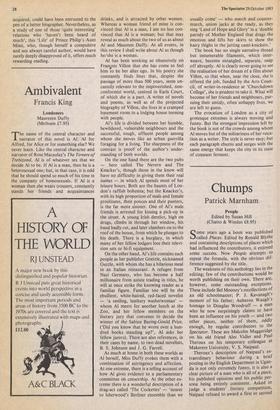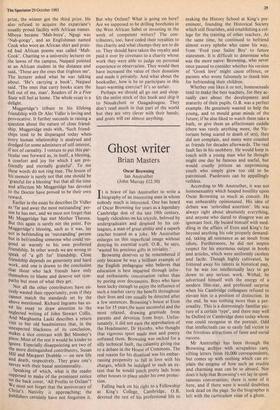Chumps
Patrick Marnham
People Edited by Susan Hill (Chatto & Windus £8.95)
Some years ago a book was published ...lulled Places. Edited by Ronald Blythe and containing descriptions of places which had influenced the contributors, it enjoyed some success. Now People attempts to repeat the formula, with the obvious dif- ference suggested by the title. The weakness of this anthology lies in the editing; few of the contributions would be worth publishing on their own. There are, however, some outstanding exceptions. These include Bel Mooney's recollections of an old schoolmaster; P. J. Kavanagh's memoir of his father; Auberon Waugh's homage to Douglas Woodruff — a man who he now surprisingly claims to have been an influence on his youth — and two other pieces, neither of them, oddly enough, by regular contributors to the Spectator. These are Malcolm Muggeridge on his old friend Alec Vidler and Paul Theroux on his temporary colleague at Makerere University, V. S. Naipaul.
Theroux's description of Naipaul's ex- traordinary behaviour during a brief posting to the English Department in Ugan- da is not only extremely funny, it is also a clear picture of a man who is all of a piece, his published opinions and his public per- sona being entirely consistent. Asked to judge a students' literary competition, Naipaul refused to award a first or second prize, the winner got the third prize. He also refused to acquire the expatriate's usually proud facility with African names. Mboya became 'Mah-boya', Ngugi was `Nah-googy', and an Englishman named Cook who wore an African shirt and prais- ed bad African poems was called 'Mah- Cook'. Chatting to a university lecturer on the lawns of the campus, Naipaul pointed at an African student in the distance and said, 'Those are the ones that frighten me'. The lecturer asked what he was talking about. 'He's carrying a book', Naipaul said. 'The ones that carry books scare the hell out of me, man'. Readers of In a Free Slate will feel at home. The whole essay is a delight.
Muggeridge's tribute to his lifelong friendship with Dr Alec Vidler is loving and provocative. It further succeeds in raising a question about the nature of close friend- ship. Muggeridge ends with, 'Such friend- ships tend to be disparaged today when. every human relationship is analysed and dredged for some admixture of self-interest, if not of carnality. I venture to put this par- ticular one forward as, in itself, a blessing, a comfort and joy for which I am pro- foundly and eternally grateful'. To me these words do not ring true. The lesson of his memoir is surely not that one should be 'grateful for a blessing' but that all the time and affection Mr Muggeridge has devoted to the Doctor have proved to be their own reward.
Earlier in the essay he describes Dr Vidler as 'far and away the most outstanding' per- son he has met, and we must not forget that Mr Muggeridge has met Mother Theresa. But this again is surely not the point. For Muggeridge's blessing, such as it was, lay not in befriending an 'outstanding' person but in befriending someone who could res- pond so warmly to his own proferred friendship. In other words we are wrong to Speak of 'a gift for' friendship. Close friendship depends on generosity and hard work, and one is drawn to the conclusion that those who lack friends have only themselves to blame and deserve not sym- Pathy but most of what they get.
Not all the other contributors have en- tirely wasted their opportunity, even if they cannot match the standards set by the above mentioned. Richard Ingrams has us- ed his essay to draw attention to the neglected writing of John Stewart Collis. And Marghanita Laski describes a return visit to tier old headmistress that, in the unexpected blackness of its conclusion, makes a nice contrast with Bel Mooney's Piece. Most of the rest it would be kinder to ignore. Especially disappointing are two of the more distinguished contributors, Susan Hill and Margaret Drabble — on new life and death, respectively. They grate one's nerves with their banal sentimentality. Speaking of which, what is the reader supposed to make of the prominent notice on the back cover, 'All Profits to Oxfam'? We must not forget that the anniversary of Christ's Nativity ;s approaching; the Publishers certainly have not forgotten it. But why Oxfam? What is going on here? Are we supposed to be drilling boreholes in the West African Sahel or investing in the work of competent writers? The con- tributors, too, have ceded their royalties to this charity and what chumps they are to do so. They should have taken the royalty and paid it over by covenant to a charity whose work they were able to judge on personal experience or observation. They would then have increased the value of their donation and made it privately. And what about the bookseller, how is he to participate in this heart-warming exercise? It's so unfair.
Perhaps we should all go out and shop- lift the entire stock of this book and ship it to Nouakchott or Ouagadougou. They don't read much in that part of the world but they are very clever with their hands; and goats will eat almost anything.















































 Previous page
Previous page